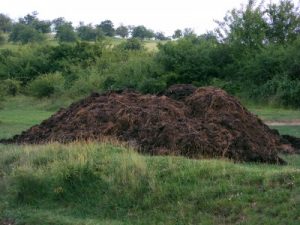
Do you have seasonal allergies? Exposure to environmental toxins can cause allergic reactions (and more) in you, your kids, and your pets.
Yep. Your pets can develop seasonal allergies, too.
Garden chemicals, moldy mulch, yard clippings, and poisonous plants …. there are toxins lurking in your garden, so how do you protect yourself and your pets?
Here’s some simple tips to protect you from unnecessary exposure to toxins when gardening, playing outside, or exercising in your backyard garden.
Avoid Garden Chemicals

Go organic, and use only organic pest controls and fertilizers.
If you have insects eating your garden or grass, you can choose a plethora of alternative solutions. You can tackle weeds in many safe and natural ways.
I put on my garden gloves and pull them out by the roots.
Natural pesticides and fertilizers might take a little longer to succeed compared to the highly chemical ones, but consistency is the key – stick with your program, and it should work over time.
You can also plant a variety of different plants and flowers in the same areas because many plants serve as pest control for the other plants.
Avoid Mulch With Added Chemicals
Use only organic mulches in your garden, such as straw, leaves, cypress, and shredded bark.
Buy a chipper and make your own mulch. In the Autumn, don’t rake and remove your fallen leaves; let them cover your soil as a moist, winter blanket. By Spring, they’ll be mulch.
If you use mulch for weed protection, use several sheets of newspaper, grocery bags, or cardboard under your mulch.
In a study at the University of Vermont, a 6-inch layer of shredded newspaper applied at the beginning of summer allowed no more than 8 weeds per square yard to sprout for the following two summers.
So, without adding more mulch, the newspaper controlled weeds for two seasons.

Don’t Bag Clippings
Mow your lawn with a mulching blade and do not bag your clippings – rake them back into the soil or compost them.
Grass clippings will reseed your lawn by penetrating back into the soil as opposed to using heavy “fertilizers” to plump up its growth.
Add Organic Vegetable Seeds To Your Lawn
Dogs and cats love to eat grass for the B-vitamins, particularly B15 and B17, also known as nitrilosides. By keeping toxic chemicals off your grass and by adding fresh garden “sprouts” into your lawn, your pets can graze on a healthy variety of greens.

Periodically throw lettuce, kale, and spinach seeds onto your lawn, and let them fill in any bald spaces with nutrients rich in nitrilosides.
Remember that your pets will eat grass, so if it’s sprayed with chemicals, they can ingest them.
Vitamin D

Make sure that you, your family, and your pets get outside each day for at least 20 minutes of healing sunshine.
I can always write so much more on the health benefits of vitamin D, but I’ll save that for another post.
Horse And Cattle Health
Make sure your grazing fields and pastures are not toxic in harsh chemicals for grazing animals, like horses, goats, and cows.
Organic pasture maintenance can be easily done using the tips above, especially when seeding a variety of grasses, grains, lettuces, and vegetables planted together.

Pet Hair Analysis
If you want to know if your pet has been exposed to toxic chemicals, get a hair analysis done for them.
I have done hair tests on dogs, cats, and horses. This will let you know if your cherished companion is accumulating toxins that can stress their immune systems.
I love all of my animals, as most of us do. Animals live close to the ground, so make sure that they are not exposed to unnecessary toxic chemicals.
Everyone will thank you by living a long and happy life.
___________________________
If you want to learn more about health and disease prevention, contact me at janethull.com. Remember that you are never alone when you are looking for good health!
Gain access to all of my online programs, ongoing support, monthly Q&A, and more. I look forward to supporting you on your journey to alternative health and wellness.
_____________
Disclaimer: This article is for informational purposes only, and is educational in nature. The FDA may not have evaluated some of the statements. This article is not intended to diagnose, treat, cure, or prevent any disease. Please discuss with your own, qualified health care provider before adding supplements or making any changes to your dietary program.
Before taking vitamins, consult your doctor; pre-existing medical conditions or medications you are taking can affect how your body responds to multivitamins.
You have our permission to reprint this article if you attribute us with a live back-link to this article and the youtube links. https://janethull.com/